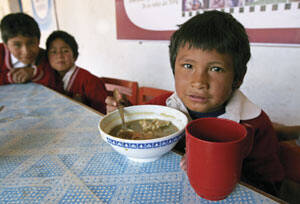With its fields of potatoes and artichokes, the Mantaro Valley in the central Andes region of Junin is known as Peru’s breadbasket. But the roads winding from the valley floor up the steep slopes lead to remote villages where farmers barely grow enough to feed their families. More than 58 percent of the people in the region live in poverty, and one-third of the children are malnourished.
Government officials say that will change when a new copper mine opens, pumping more than $100 million a year in tax revenues into the region. But in a country that has shipped mineral wealth abroad since the 16th century and still struggles to wrest itself from poverty, some observers wonder if that promise is hollow. There is good reason for doubt. Studies show that countries whose economies depend heavily on exports of natural resources like minerals, oil and natural gas tend to be poorer and less democratic than those with more diverse economies. Academics call it the “resource curse.”
Archbishop Pedro Barreto Jimeno of Huancayo, whose see includes the region where the $2.2 billion Chinese-owned Toromocha mine will operate, said that pouring money into the region is not enough. “There has to be a comprehensive plan for the region’s development,” he said, “and there is none.”
Governments also must be accountable to citizens for how they use the windfall reaped from oil, gas and mining projects, said Rees Warne, an adviser on extractive industries at Catholic Relief Services, the U.S. bishops’ overseas relief and development agency. “It’s about equity and justice,” she said. “These countries have natural wealth, but it’s not benefiting all of the citizens.”
Experts say countries can take steps to ward off the resource curse, but weak governments postpone the task as easy money rolls in during boom times. When the bust comes and oil, gas and mineral prices fall, they are unprepared. Resource wealth poses other hazards as well. Bribes, kickbacks, shady accounting and political cronyism reduce the revenues available for education, health, road construction and other public programs.
Churches and civic organizations are putting pressure on petroleum and mining companies to reveal how much they pay in taxes and royalties and on governments to explain how they use the money. The efforts make the deals more transparent, according to Warne. The “publish-what-you-pay” movement has “gotten people more involved in looking at national budgets and holding government accountable for its spending,” Warne said. C.R.S. and other advocacy groups are urging U.S. lawmakers to pass legislation “that would require all oil, gas and mining companies that are listed on U.S. stock exchanges, no matter where they are based, to report to the Securities and Exchange Commission on what they pay to governments where they operate,” Warne said.
But even those efforts cannot ensure that governments in resource-rich countries distribute funds equitably or efficiently. The Cusco region of Peru, where a large natural gas project went on line in 2004, receives more than $250 million a year in tax revenue and has reaped some $2 billion in royalties. But in the district where the wells are located, 68 percent of local residents lack at least one of what the government considers “basic needs,” such as adequate housing, sewers or access to education.








